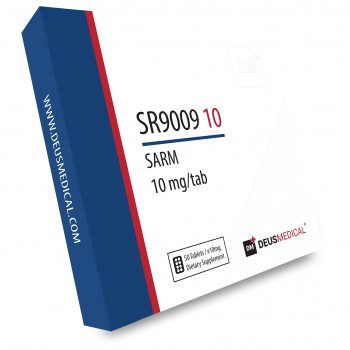


Initially designed as a regulator of the circadian clock, SR9009 (Stenabolic) has emerged as a promising therapeutic agent for aggressive prostate cancer, specifically the PCS1 subtype. By inhibiting key genes in the LXRα/FOXM1 pathway, SR9009 disrupts cellular processes essential for tumor growth, including cell cycle progression and migration. In vitro studies reveal that SR9009 effectively reduces cell viability and enhances apoptosis without significant toxicity to normal prostate cells, highlighting its targeted anticancer potential .
Xu, H., Zhang, J., Zheng, X., Tan, P., Xiong, X., Yi, X., Yang, Y., Wang, Y., Liao, D., Li, H., Wei, Q., Ai, J. and Yang, L., 2022. SR9009 inhibits lethal prostate cancer subtype 1 by regulating the LXRα/FOXM1 pathway independently of REV-ERBs. Cell Death & Disease.
Disclaimer: Information provided it this page is for general information only and does not substitute for professional medical advice.
For detailed information about SR9009 by Deus Medical, consult with your doctor or healthcare professional.


Xu, H., Zhang, J., Zheng, X., Tan, P., Xiong, X., Yi, X., Yang, Y., Wang, Y., Liao, D., Li, H., Wei, Q., Ai, J. and Yang, L., 2022. SR9009 inhibits lethal prostate cancer subtype 1 by regulating the LXRα/FOXM1 pathway independently of REV-ERBs. Cell Death & Disease.

Xu, H., Zhang, J., Zheng, X., Tan, P., Xiong, X., Yi, X., Yang, Y., Wang, Y., Liao, D., Li, H., Wei, Q., Ai, J. and Yang, L., 2022. SR9009 inhibits lethal prostate cancer subtype 1 by regulating the LXRα/FOXM1 pathway independently of REV-ERBs. Cell Death & Disease.

Xu, H., Zhang, J., Zheng, X., Tan, P., Xiong, X., Yi, X., Yang, Y., Wang, Y., Liao, D., Li, H., Wei, Q., Ai, J. and Yang, L., 2022. SR9009 inhibits lethal prostate cancer subtype 1 by regulating the LXRα/FOXM1 pathway independently of REV-ERBs. Cell Death & Disease.